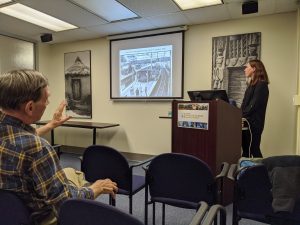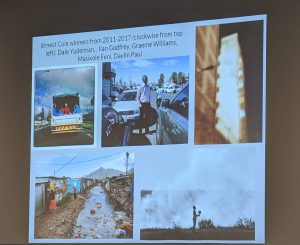 On Friday February 28, Dr. Meghan Kirkwood gave a Baraza lecture titled, “Social Documentary Photography in the Twenty-first Century: The Ernest Cole Award and the Legacy of Struggle Photography in South Africa.” Dr. Kirkwood is assistant professor of art at Washington University—St. Louis and earned her doctorate at UF. Her publications include: “Land as Natural Resource: Representations of Mining in Contemporary South African Landscape Photography.” Photography and Culture (2019); “Social Documentary and Personal Investigations in Contemporary South African Photography: Tracey Derrick’s ‘One in Nine’ Series.” Social Dynamics (2014); and “Post-independence Architecture through North Korean Modes: Namibian Commissions of the Mansudae Project.” in A Companion to Modern African Art (2013).
On Friday February 28, Dr. Meghan Kirkwood gave a Baraza lecture titled, “Social Documentary Photography in the Twenty-first Century: The Ernest Cole Award and the Legacy of Struggle Photography in South Africa.” Dr. Kirkwood is assistant professor of art at Washington University—St. Louis and earned her doctorate at UF. Her publications include: “Land as Natural Resource: Representations of Mining in Contemporary South African Landscape Photography.” Photography and Culture (2019); “Social Documentary and Personal Investigations in Contemporary South African Photography: Tracey Derrick’s ‘One in Nine’ Series.” Social Dynamics (2014); and “Post-independence Architecture through North Korean Modes: Namibian Commissions of the Mansudae Project.” in A Companion to Modern African Art (2013).
Her current research draws from her dissertation, which broadly questioned how contemporary photographers document land and landscape in South Africa. The history of photography in South Africa was deeply impacted the desire to expose injustices of apartheid to a global audience. Images were used as proof that events during apartheid were not outliers like the South African government suggested. This point of focus promoted the adoption of documentary and struggle aesthetics in South African photography. Dr. Kirkwood asks, what is the legacy of this movement and how has it impacted contemporary documentary photographers?

Her presentation explored this question through the work of Ernest Cole Award recipients. The Ernest Cole Award was created by Paul Weinberg and David Goldblatt, two struggle/documentary photographers (although the award is not limited to this aesthetic). They created the award in honor of Ernest Cole, the first black freelance photographer in South Africa whose seminal work, House of Bondage, depicted everyday life during the apartheid-era. Through an examination of the five recipients of the Ernest Cole Award—Dale Yudelman, Ilan Godfrey, Graeme Williams, Masixole Feni, and Daylin Paul–Dr. Kirkwood sought to consider how documentary photography as a genre has been reinterpreted and approached in new ways in post-apartheid South Africa. She continues to work on this project, analyzing not only award winners but also submitted applications, to better understand how the award has shaped trends in style, topic, and genre adopted by photographers.